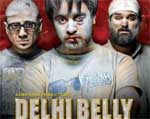 Film: “Delhi Belly”
Film: “Delhi Belly”
Director: Abhinay Deo
Starring: Imran Khan, Vir Das, Kunaal Roy Kapur, Vijay Raaz
It is a cliche as old as this nation – of the many Indias that breathe under one India, Indian cinema has hardly been representative of even a few of these. Yet, one would have expected, after globalization and the emergence of a new bold, urban India, that at least this class would get representation in commercial cinema.
Though there have been successful attempts in the past, it is with “Delhi Belly” that the urban, money-is-everything, foul-mouthed India has been captured with aplomb. And that, depending upon your morality, is good or bad.
Tashi (Imran Khan), a Delhi-based journalist living filthily with two roommates, winds up with a bunch of ‘desi’ goons chasing him and his mates after a mix-up. The three are forced to navigate the dark underbelly to survive, while encountering one situation after another and one idiosyncratic Indian after another.
The beauty of Abhinav Deo’s film is not its smooth story, loosely inspired by the type of films made famous by Guy Ritchie, ‘Lock Stock..’ and ‘Snatch’ among others, neither is it Ram Sampath’s catchy music that beats to the rhythm of the film, or the slick, seamless direction, or its immaculate casting and performance or even its wickedly witty dialogues. The true beauty of the film is in all these elements together creating a madcap image of a new, unabashed, even shameless section of India.
Though Delhi is referred to in its title, it is not the real Delhi that Dibakar Banerjee captures with satirical reality in his films. Instead, it is the image of a Delhi populated by young, educated, newly ‘liberated’ urbanites. In that it is the splitting image of that young urban India anywhere perpetually churning like the stomach of a character in the film, a showcasing of this nations new neo-liberal underbelly.
However, the other Indias might not take kindly to the film. Hypocritical Indians okay with female infanticide and dowry would be aghast at how almost every ‘bad’ word that they know is spoken everywhere on the streets and in homes, finds a place in the usually moralistic Bollywood. Cinema purists too may cry foul that the film does not really have a soul and is not really trying to say anything. Though a legitimate accusation, in not having a soul and not really being concerned or serious about anything, the film holds a mirror to a large section of the country. And that is a big statement in itself.
For decades Indian cinema has been shackled with a morality that has not kept pace with the changing morality of life around. Though the morality of the film is strictly of urban, young, middle-class India, and isn’t representative, it is welcome as this is the farthest Bollywood has gone to truly representing urban life. And just for that, hats off to Aamir Khan for yet again, after “Peepli Live” and “Dhobi Ghat”, believing in a different kind of cinema, even while he doles out a “Ghajini” in the same breath.
The last scene of “Delly Belly” is bound to become as iconic as the one in Mahesh Bhatt’s 1990 musical ‘Aashiqui’. If there the lovers were so embarrassed of their surroundings that they had to kiss under a coat, here the lovers who are not even girlfriend-boyfriend are so brazen and caught in the heat of the moment that the guy kisses the girl in full view, half his body hanging out a slowly moving Maruti car symbolic of old India, unconcerned whether others are looking (which they are not). If that isn’t the urban, chic, and unconcerned-about-others India that has moved away from the morality of an un-liberalized India in ‘Aashiqui’ then what is?
-With bollywoodworld.com input
